Related Research Articles

GLAAD is an American non-governmental media monitoring organization. Originally founded as a protest against defamatory coverage of gay and lesbian demographics and their portrayals in the media and entertainment industries, it has since expanded to queer, bisexual, and transgender people.
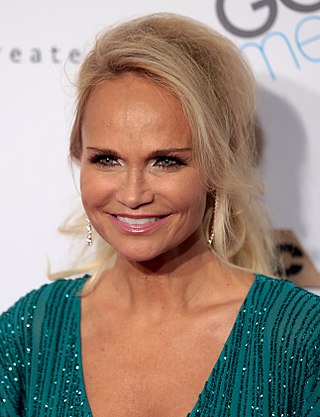
Kristin Dawn Chenoweth is an American actress and singer, with credits in musical theatre, film, and television. In 1999, she won a Tony Award for Best Featured Actress in a Musical for her performance as Sally Brown in You're a Good Man, Charlie Brown on Broadway. In 2003, Chenoweth was nominated for a second Tony Award for originating the role of Glinda in the musical Wicked. Her television roles include Annabeth Schott in NBC's The West Wing and Olive Snook on the comedy drama Pushing Daisies, for which she won a Primetime Emmy Award for Outstanding Supporting Actress in a Comedy Series in 2009.
Symbolic annihilation is a term first used by George Gerbner in 1976 to describe the absence of representation, or underrepresentation, of some group of people in the media, understood in the social sciences to be a means of maintaining social inequality. This term is usually applied to media criticism in the fields of feminism and queer theory to describe the ways in which the media promotes stereotypes and denies specific identities. Gaye Tuchman (1978) divided the concept of symbolic annihilation into three aspects: omission, trivialization and condemnation. This multifaceted approach to coverage not only vilifies communities of identity, but work to make members invisible through the explicit lack of representation in all forms of media ranging from film, song, books, news media and visual art.
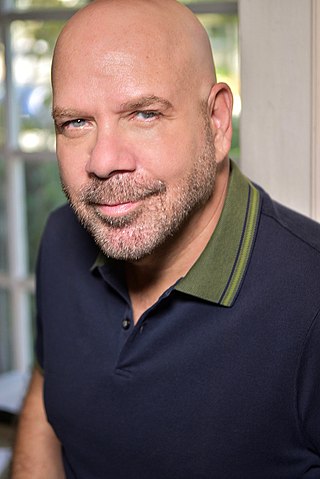
Jason Stuart, also known by his real name Stuart Ted Greif, is an American actor and comedian. He first won notice on Star Search, where he lost to Martin Lawrence. He came out publicly in 1993 on the syndicated daytime talk show Geraldo, and has been called "the first openly gay stand-up comedian" by various media outlets.

Cory Allan Michael Monteith was a Canadian actor and musician. He made his acting debut in the television series Stargate Atlantis (2004), and had other roles in shows including Smallville (2005), and Supernatural (2005). During his career, he starred in over eighteen dramas and seventeen films, with Monte Carlo (2011), Final Destination 3 (2006), and Sisters & Brothers (2011), all becoming commercially successful.

Jonathan Drew Groff is an American actor and singer. Known for his performances on stage and screen, he has received several awards including a Tony Award and a Grammy Award as well as a nomination for a Primetime Emmy Award.

Chad Allen is an American psychologist and retired actor. Beginning his career at the age of seven, Allen is a three time Young Artist Award winner and GLAAD Media Award honoree. He was a teen idol during the late 1980s as David Witherspoon on the NBC family drama Our House and as Zach Nichols on the NBC sitcom My Two Dads before transitioning to an adult career as Matthew Cooper on the CBS western drama Dr. Quinn: Medicine Woman. He announced his retirement from acting in April 2015.
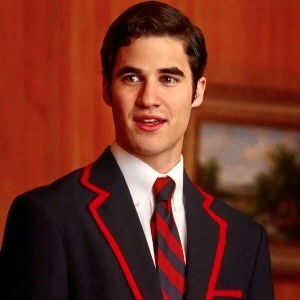
Blaine Devon Anderson is a fictional character from the American musical comedy-drama television series Glee. Played by Darren Criss, Blaine was introduced in the sixth episode of the second season as the openly gay lead singer of the Dalton Academy Warblers, a rival show choir to New Directions, the show's primary musical group. Blaine initially served as a mentor for New Directions member Kurt Hummel. Chemistry between the two, combined with fan support for the couple, led series co-creator Ryan Murphy to pair them romantically. Their relationship has been well received by critics, and they have been named "the most beloved TV couples of the millennium" by Jarett Wieselman of the New York Post. At the beginning of the third season, Blaine transfers to McKinley High and joins New Directions; concurrently, Criss was promoted from recurring guest star to the show's main cast.

The 64th Annual Tony Awards took place on Sunday, June 13, 2010, held again at Radio City Music Hall in New York City. The host was Sean Hayes. These awards paid tribute to Broadway productions during the 2009–2010 season. The cut off-date for Tony eligibility was April 29, 2010, and the nominations were announced on May 4.

Kurt Elizabeth Hummel is a fictional character from the Fox musical comedy-drama series Glee. Series creators Ryan Murphy, Brad Falchuk and Ian Brennan initially conceived of him as a fashionable gay countertenor who is routinely bullied at school. Kurt is portrayed by actor Chris Colfer, and has appeared as a character on the show since its pilot episode, first broadcast on May 19, 2009. Glee follows the trials of the New Directions glee club at the fictional William McKinley High School in the town of Lima, Ohio, of which Kurt is a member. His storylines in the first season focus on his struggle with his sexuality as he comes out to his father and friends, and deals with his romantic feelings for Finn Hudson, the straight co-captain of the glee club.
Historically, the portrayal of lesbian, gay, bisexual, transgender and queer (LGBTQ) people in media has been largely negative if not altogether absent, reflecting a general cultural intolerance of LGBTQ individuals; however, from the 1990s to present day, there has been an increase in the positive depictions of LGBTQ people, issues, and concerns within mainstream media in North America. The LGBTQ communities have taken an increasingly proactive stand in defining their own culture, with a primary goal of achieving an affirmative visibility in mainstream media. The positive portrayal or increased presence of the LGBTQ communities in media has served to increase acceptance and support for LGBT communities, establish LGBTQ communities as a norm, and provide information on the topic.
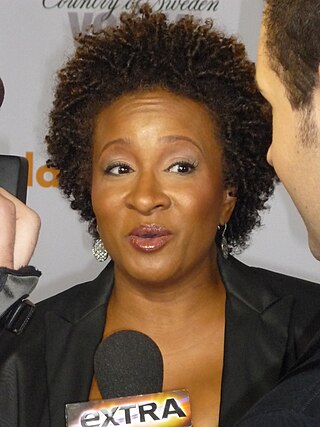
The 21st GLAAD Media Awards was the 2010 annual presentation of the media awards presented by the Gay & Lesbian Alliance Against Defamation. The awards seek to honor films, television shows, musicians and works of journalism that fairly and accurately represent the LGBT community and issues relevant to the community. The 21st annual award ceremony included 116 nominees in 24 English-language categories, and 36 Spanish-language nominees in eight categories.

Darren Everett Criss is an American actor, singer, and songwriter. He rose to fame starring on the television series Glee (2010–2015) and received Emmy and Golden Globe acting awards for his leading role as spree killer Andrew Cunanan in The Assassination of Gianni Versace: American Crime Story (2018). He has also appeared on Broadway and in film and has released several musical albums.

Alex Eugene Newell is an American actor and singer. They are known for their role as Unique Adams on the Fox musical series Glee and Mo on Zoey's Extraordinary Playlist. Newell also starred as Asaka in the Broadway revival of Once on This Island at the Circle in the Square Theatre in 2018. For their role in Shucked, they won the 2023 Tony Award for Best Featured Actor in a Musical. Newell and J. Harrison Ghee were the first openly non-binary actors to be nominated for and win a Tony Award.

The Normal Heart is a 2014 American television drama film directed by Ryan Murphy and written by Larry Kramer, based on his 1985 play of the same name. The film stars Mark Ruffalo, Matt Bomer, Taylor Kitsch, Jim Parsons, Alfred Molina, Joe Mantello, Jonathan Groff, and Julia Roberts.
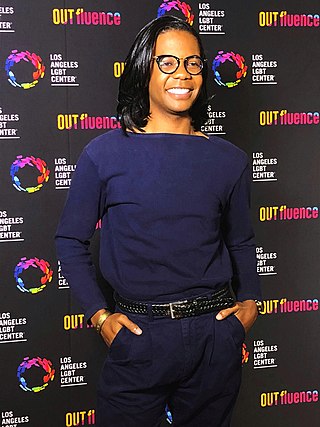
Clark Moore is an American actor and writer. He is best known for the role of Ethan in the film Love, Simon and the role of AJ on the final season of Crazy Ex-Girlfriend.
References
- ↑ Karpel, Ari (April 2010). "Sean Hayes: I Am Who I Am". The Advocate. Retrieved 2010-05-23.
- ↑ Setoodeh, Ramin (April 26, 2010). "Straight Jacket". Newsweek. Archived from the original on 30 April 2010. Retrieved 19 March 2017.
- ↑ Jensen, Michael (April 27, 2010). ""Newsweek"'s Ramin Setoodeh Strikes Again: Gay Actors Can't Play Straight". AfterElton.com. Retrieved 2010-05-23.
- ↑ Jensen, Michael (May 7, 2010). "Kristin Chenoweth "Offended" by Ramin Setoodeh's Homophobic Article in Newsweek". AfterElton.com. Retrieved 2010-05-23.
- ↑ EW Staff (May 11, 2010). "'Glee' creator Ryan Murphy pushed for 'Newsweek' boycott". Entertainment Weekly. Retrieved 2010-05-23.
- ↑ EW Staff (May 13, 2010). "'Glee' creator Ryan Murphy pens another open letter; says he's spoken to author of 'Newsweek' article (exclusive)". Entertainment Weekly. Retrieved 2010-05-23.
- ↑ Barrios, Jarrett; Dustin Lance Black (May 12, 2010). "'Milk' scribe joins GLAAD against Newsweek". The Hollywood Reporter. Archived from the original on May 17, 2010. Retrieved 2010-05-23.
- ↑ "GLAAD, Ryan Murphy demand apology from 'Newsweek'". USA Today. May 12, 2010. Retrieved 2010-05-23.
- ↑ Shields, Rachel (August 22, 2010). "Jonathan Groff: Rock Hudson for the 21st century". The Independent. Retrieved 2010-08-24.
- ↑ Setoodeh, Ramin (May 10, 2010). "Out of Focus". Newsweek. Retrieved 2010-05-23.
- ↑ Jensen, Michael (May 11, 2010). "Newsweek's Ramin Setoodeh Responds to Controversy: I'm the Victim Here". AfterElton.com. Retrieved 2010-05-23.
- ↑ Peyser, Marc (May 12, 2010). "Straight Talk, Continued". Newsweek. Retrieved 2010-05-23.
- ↑ Sorkin, Aaron (May 12, 2010). "Now That You Mention It, Rock Hudson Did Seem Gay". The Huffington Post. Retrieved 2010-05-23.
- ↑ Wallenstein, Andrew (May 12, 2010). "Why Newsweek need not apologize to GLAAD". The Hollywood Reporter. Retrieved 2010-05-23.